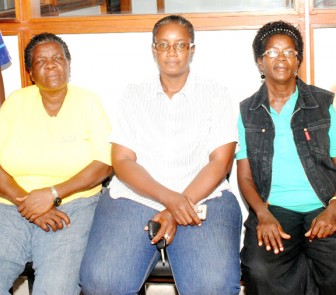Gloria Adams, Deborah Fraser and Beverley Halley are among more than a dozen members of the Central Mahaicony Perth Village Farmers Association, who have spent several years of their lives in one of the most arduous pursuits in the farming sector.
Adams and Fraser are single women who “go it alone”, each tending around 50 pigs. Halley is married and she and her husband are farmers. Apart from rearing pigs they all cultivate cash crops. They talk about the challenges associated with reading pigs without ever sounding as though they are complaining. Fraser said that while some of the pursuits associated with pig-rearing are definitely “a man’s job,” in the absence of male help “you simply have to put your mind to it”.
With Christmas approaching, these women are busy. There are pigs to be sold and they concede that markets are still being sought. When Stabroek Business spoke with them earlier this week the trio was taking advantage of a visit to Georgetown “on association business” to seek out markets.

Finding markets has been an ongoing challenge for these women. Over the years their profit margins have been squeezed by middlemen who have taken the vast majority of the profit to be secured from the market. The relationships between them and the middlemen had arisen out of necessity. These women believe, however, that if they try harder, they can access the market directly.
Fraser is also a minibus owner. She said she is prepared to place her minibus at the disposal of the members of the association. Access to their own transportation would help to keep their overheads down. Over time, transportation-related costs coupled with the tough-bargaining middlemen, who secure as much as 20 per cent of the overall price as their own profit have made life difficult for the pig-rearers.
The women admit that their limited access to markets reposes in their inability, up until now, to create efficient marketing structures. Their dependence on urban middlemen has been a function of their own disconnect from the urban market. This Christmas they are hoping to develop marketing relationships that will sustain themselves into the new year and beyond.
By sheer coincidence, this newspaper witnessed an exchange between the women farmers and a potential buyer. It was an education. Pigs are sold based on an estimation of the difference between the edible meat and those parts that must be discarded. When the estimation is done a price is set. The exercise is conducted by experts and once the price is agreed and payments are made the pig is slaughtered. The negotiations between the potential buyer and the women commenced with an enquiry about the cost per pound and concluded with a commitment on the part of the potential buyer to visit the farms next Sunday. By the end of the discourse the women and the potential buyer appeared to have agreed on a price of $500 per pound.
The women appeared comfortable with the deal struck with the potential buyer. It was as close to a market as they have come in some while; more than that the potential buyer suggested that a long-term commitment was possible.
How critical it is that the pigs be taken to market in a timely manner became clear from part of the conversation between the women and the potential buyer. Having established a price, the next thing that the potential buyer made clear was that he had no interest in pigs that weigh more than 70 pounds. The women appeared relieved.
The women are experts in their own right. Adams, who is also a cash crop farmer, explained that apart from being an ideal way of disposing of garden waste or an oversupply of produce, pigs also provide valuable organic fertilizer. Pigs, therefore, are often seen as a natural small-farmer’s enterprise; a means of subsidising income.
The women explained that the factors most responsible for successful pig-farming are comfortable surroundings, daily attention to and observation of stock. In other words, there is no substitute for good husbandry.
While most of their energies are invested in rearing pigs, their knowledge of the local market for pork is deficient. Other issues pertaining to pig-rearing arise. Apparently, most of the farmers operating in the three-mile stretch in which members of the association reside comprise small families. They contemplate expansion, but those plans are constrained by the fact that there is a critical labour shortage in the communities. Relatively small wages and alternative employment – mostly in the goldfields – mean that the farmers must do the job themselves.
There are other constraints too, like the fact that a defective koker constantly lets the salt water in from the sea. Once this happens crops cultivated in a three-mile area between Fellowship and Airy Hall are ruined. For the time being, the rains are a blessing. The rains dilute the salt water that has settled in the drainage system and the crops flourish. After a week or so of persistent rains, however, the threat of flooding arises.
The association could do with more official help. When the members met Agriculture Minister Dr Leslie Ramsammy some weeks ago he conceded that he had not, up until then, heard of the group. Now that the minister has made their acquaintance, the farmers hope they can benefit from support in the form of fertiliser and seeds. While, the women pig farmers could do with much more enlightenment on marketing, their efforts are more than deserving of patronage.





